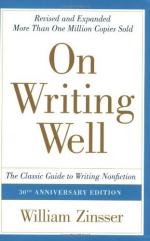
|
| Name: _________________________ | Period: ___________________ |
This quiz consists of 5 multiple choice and 5 short answer questions through Part III: Chapter 18 Writing About the Arts: Critics and Columnists.
Multiple Choice Questions
1. What was the best advice Zinsser ever received about having opinions in writing?
(a) To always second guess an argument and make a pro and con list.
(b) Take a stand and stick to it. One should never "go peeing down both legs."
(c) To never second guess a story.
(d) It was to argue both sides of a story.
2. Do criticism writers need to take a stance on a show?
(a) Absolutely. They have the power to make or break a show.
(b) Opinions should always be left out of writing.
(c) Yes, but they should mind their wording to not offend those in the show.
(d) No, that should be left up to the audience.
3. What is Zinsser's preferred method for interviewing?
(a) He likes to use pencils and paper.
(b) He doesn't use anything. He just listens.
(c) He likes to use pens and markers.
(d) He likes audio recorders.
4. Why do criticism writers have to be at a higher level than other writers?
(a) Criticism writers are no different. They still need to use the same basic rules of writing.
(b) Criticism need to be stronger at literary elements because they need to recreate a scene or a song in the imagination of their readers with words only.
(c) Only those able to understand the arts can write about them, and very little people can.
(d) Criticism is harder to write about because it tends to be less attractive than other writing.
5. What is a major job of a nonfiction writer?
(a) Conducting interviews with people who know about the writing project subject.
(b) Taking on a project with a clean slate. Just like a jury in a legal battle.
(c) Majoring in the subject they will write about.
(d) Learning as much as possible about a subject before taking on a project.
Short Answer Questions
1. Where is there an opportunity for great creative writing?
2. What is a requirement for good literary criticism?
3. How does a thesaurus help with brainstorming?
4. What is one task that a good writer constantly does?
5. What is another important characteristic of a writer?
|
This section contains 471 words (approx. 2 pages at 300 words per page) |

|




